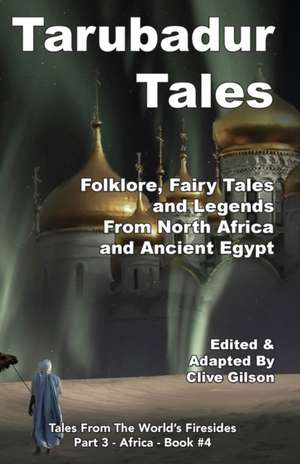Tarubadur Tales: Tales From The World's Firesides - Africa, cartea 4
Editat de Clive L Gilsonen Limba Engleză Paperback – 15 oct 2021
The people of the Maghreb and the Sahara speak various dialects of Berber and Arabic and almost exclusively follow Islam. The Arabic and Berber groups of languages are distantly related, both being members of the Afro-Asiatic family. The Sahara dialects are generally considered to be notably more conservative than those of coastal cities. Over the years, Berber peoples have been influenced by other cultures with which they came in contact: Nubians, Greeks, Phoenicians, Egyptians, Romans, Vandals, Arabs, and lately Europeans. The cultures of the Maghreb and the Sahara, therefore, combine elements from indigenous Berber, Arab and neighbouring parts of Africa and beyond. In the Sahara, the distinction between sedentary oasis inhabitants and nomadic Bedouin and Tuareg is particularly marked.
The diverse peoples of the Sahara are usually categorized along ethno-linguistic lines. In the Maghreb, where Arab and Berber identities are often integrated, these lines can be blurred. Some Berber-speaking North Africans may identify as "Arab" depending on the social and political circumstances, although substantial numbers of Berbers, or Imazighen have retained a distinct cultural identity which in recent times has been expressed as a clear ethnic identification with Berber history and language. Arabic-speaking Northwest Africans, regardless of ethnic background, often identify with Arab history and culture and may share a common vision with other Arabs. This, however, may or may not exclude pride in and identification with Berber or other parts of their heritage.
The Nile Valley through northern Sudan traces its origins to the ancient civilizations of Egypt and Kush. The Egyptians over the centuries have shifted their language from Egyptian to modern Egyptian Arabic, while retaining a sense of national identity that has historically set them apart from other people in the region. Most Egyptians are Sunni Muslim and a significant minority adheres to Coptic Christianity. In Nubia, straddling Egypt and Sudan, a significant population retains the ancient Nubian language but has adopted Islam. The northern part of the Sudan is home to a largely Arab Muslim population, but further down the Nile Valley you find the largely non-Muslim Nilotic and Nuba peoples.
As you will, no doubt, appreciate, this rich melange of migrations and contacts has profoundly influenced storytelling among the varied cultural, ethnic and religious groups across North Africa. There is the usual mix of magic and animism and a strong sense of duty and morality, even if those senses are a little different to some of the cultural norms of the early twenty-first century. There is also the usual mix of force and brutality in folklore and fairy tales, themes that we have seen writ large across all of the books in the Fireside series.
That said, and as ever, selecting and adapting these tales has been both a joy and a labour, but always a labour of love.
| Toate formatele și edițiile | Preț | Express |
|---|---|---|
| Paperback (1) | 179.30 lei 3-5 săpt. | |
| Clive Gilson – 15 oct 2021 | 179.30 lei 3-5 săpt. | |
| Hardback (1) | 246.71 lei 3-5 săpt. | |
| Touchladybirdlucky Studios – 15 oct 2021 | 246.71 lei 3-5 săpt. |
Preț: 179.30 lei
Nou
Puncte Express: 269
Preț estimativ în valută:
34.31€ • 35.99$ • 28.56£
34.31€ • 35.99$ • 28.56£
Carte disponibilă
Livrare economică 11-25 martie
Preluare comenzi: 021 569.72.76
Specificații
ISBN-13: 9781915081018
ISBN-10: 1915081017
Pagini: 450
Dimensiuni: 140 x 216 x 26 mm
Greutate: 0.57 kg
Editura: Clive Gilson
Colecția Tales From The World's Firesides - Africa
Seria Tales From The World's Firesides - Africa
ISBN-10: 1915081017
Pagini: 450
Dimensiuni: 140 x 216 x 26 mm
Greutate: 0.57 kg
Editura: Clive Gilson
Colecția Tales From The World's Firesides - Africa
Seria Tales From The World's Firesides - Africa


